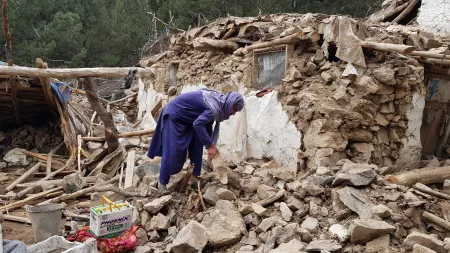CARE Afghanistan deployed 3 mobile health teams yesterday morning to Khost and Paktika provinces, immediately following the devastating earthquake in eastern Afghanistan that is estimated to have killed between 770 – 1,000 people, left thousands more injured and destroyed homes and livelihoods.
According to Dr Mohammad Anwer, Head of Health Unit – CARE Afghanistan; “Our health teams have already begun supporting at the epicenter of the earthquake with first responder assistance as well as supporting district and regional hospitals. We are, for example, supporting the regional hospital in Paktia with ambulance services. Casualties from across the neighbouring Paktika province – one of the worst affected – are being brought here for treatment. Our teams are currently managing to treat between 50-70 people per day, but more resources are urgently needed to scale up assistance to even more people.”
He adds: “Our staff on the ground are telling us that the most common injuries include head traumas, broken bones and a range of wounds. Amongst those our teams are seeing are a number of pregnant women who face added trauma and the very real risk of miscarriage.”
CARE mobile health teams include medical doctors, midwives, and psychosocial counselors. They are equipped with a full range of medical equipment, medicines and medical supplies needed for the basic trauma care, first aid support and for providing lifesaving health care - particularly for women and children.
Dr Anwer notes: “Alongside physical injuries, we are very worried about the immediate and longer-term psychological impacts of the earthquake on survivors and those living in the area who are processing the trauma of the event and loss of loved ones. Providing them with mental health support, alongside other medical assistance, as they deal with this trauma is crucial. Many of these people were already struggling to provide financially for their families due to soaring prices and inflation, and extreme levels of hungry before this latest crisis.”
Reports suggest that many of those affected have been women and children. Most are sheltering in makeshift tents or living with neighbors as homes and livelihoods have been completely destroyed.
“Also of concern, is the potential spread of cholera across the affected communities as water sources are damaged or polluted and sanitation facilities destroyed. Cholera was already endemic in the Afghanistan and cases have been reported to be on the rise even before the earthquake. It is crucial we act quickly to avert a new major outbreak of waterborne diseases,” adds Dr Anwer.
Alongside its mobile health teams, CARE is also distributing basic relief items including solar lamps and providing flexible cash assistance to help those dealing with the impacts of the earthquake get back on their feet. Over the coming days, CARE will aim to reach over 3,500 people with urgent humanitarian assistance. More funding is urgently needed to scale up the response to reach tens of thousands more with medical assistance, temporary shelter, flexible cash and basic relief items.
